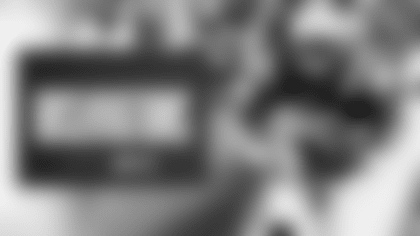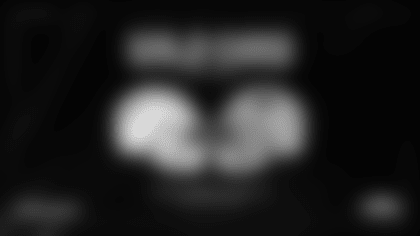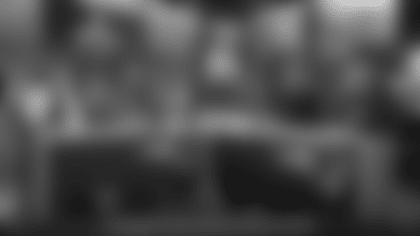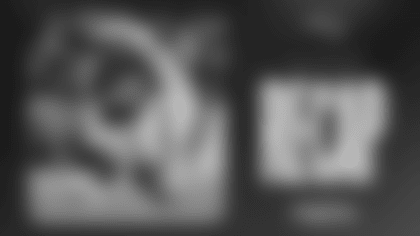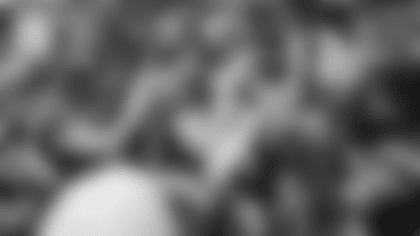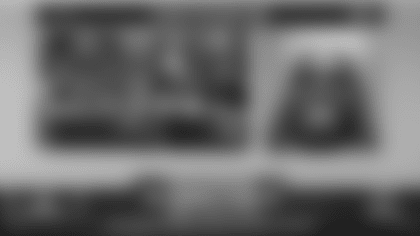]()
BB: We had a couple more guys come back out there yesterday. Hopefully we can keep that coming. It was good to see Ted [Johnson] back out there. He missed a few practices. Otherwise, we are just kind of wrapping up the preparations here on Cincinnati. It is our first away trip and there are a lot of logistical things that, once again, we need to get ironed out and established like we always do at the beginning of the year. [It is] another day at the office.
Q: Do you think that Matt Light has a better shot to play in the game this weekend?
BB: Yes. I think he has a better shot this weekend. Hopefully, he will get a little playing time.
Q: How does he look to this point?
BB: He looks like a lot of those guys look, like [Tom] Ashworth, like [Benjamin] Watson, like all of them, like everybody else has been practicing and they have a ways to go. They are making progress, but they are behind.
Q: It is the same case for Tom Ashworth?
BB: Yes.
Q: So, he will probably be out there?
BB: I think he has a chance to play too, yes.
Q: Does Light look noticeably smaller?
BB: No, he looks the same. His weight is the same. He looks the same. He had a good offseason. I thought he helped himself in the weight room and then lost it and it looks like it came back.
Q: How is Rosevelt Colvin progressing in his first week and a half back?
BB: Good. I think that Rosie has had a good week of practice. I think that he is further along than he was last week. We went through the process of getting ready to play and warming up and playing the game and actually having the game contact, the live contact. I think that we will build on that this week and do more of it.
Q: How make or break is the second preseason game for guys fighting for a roster spot?
BB: Well, I think that the preseason games are important for everyone to establish their level of play. The players that we haven't seen as much of, it gives them the opportunity to show what they can do against good, live competition. Sometimes in practice you kind of get used to working against some of the same people. The matchups are more predictable. Then you run into a team that has players that are maybe different from yours or the matchup is a little bit different and you can see where that comes out in your favor or not and gives the guys a chance to really go through the final, what we call, finishing the play, whether it is making the tackle or breaking the tackle or diving to break up the passes that we kind of discourage out there in practice, players being out of control and leaving their feet so that we don't have guys ending up falling on each others legs and that kind of thing. You really see the finishing and the final competitiveness of the players as they work to complete the play and win it at the end, not just take it all the way up to that step and then have to pull off which is the practice format.
Q: Is that especially true on special teams?
BB: Sure. There is no way in practice a player can get the same tempo in the kicking game that he gets on game day. It is faster. It is more physical. It is more violent. However much we practice it, however many times we go through it on the practice field, it is 100 miles per hour faster than that on game day. That is an adjustment for guys that aren't used to being in the kicking game, especially a lot of the guys that come from college where they were the better players on their college team and a lot of times they weren't involved in the kicking game, maybe their junior or senior years, whatever it was. So that is a transition for them. There are a lot of new techniques and the whole speed of the game in those phases is dramatic.
Q: In general terms, how has the running game gone so far in camp?
BB: It has gone all right. I thought that we had some decent production against the Eagles. It was not great, but it was okay.
Q: Can you quantify the different between Antowain Smith and Corey Dillon? Is Dillon a lot faster?
BB: I think they both can run. They are both big. They are both strong. They both can run. Corey has had a lot more production than Antowain has had.
Q: Is [Asante] Samuel to the point where you know what you are going to get from him?
BB: Well, he played 23 games last year, four in the preseason and 19 in the regular and post season. 23 games against NFL competition, yes, you have a pretty good idea. You see a lot of different receivers over 23 games, a lot of different quarterbacks. He was put in a lot of situations. We will know more about him after the second year than we did after the first, I am not saying that. 23 NFL games, I think you can evaluate a player in that time frame and he has gotten a lot of opportunities against a lot of good players, a lot of different types of players and overall I think he has given a pretty good account of himself. We have confidence in him out there.
Q: Do you feel like Rosevelt Colvin has his quickness back?
BB: I think that Rosevelt looks good. I think he looks good. If there is a gap there, I don't know. There certainly is a gap in terms of the last time he has played. So, how much of it is timing and really getting into game shape and all of that, we will see. I am not sure about that. Physically, he looks pretty good.
Q: Do you think he will get more time this weekend?
BB: Yes, I do.
Q: What was your reaction to the NFL memo regarding the way the injury report must now be done?
BB: However they want us to do it, that is how we will do it. We will comply with whatever the league rules are.
Q: But it is different than what you have done in the past.
BB: Right, well rules change every year in one way or another. Whatever they are, then it is our job to understand them and comply with them. We don't make them but we will abide by them just like the other 31 organizations do.
Q: Can you talk about how Dan Klecko's transition is going from down lineman to linebacker?
BB: I think it is going good. I think it is a big jump. I think it is harder to go from being a down lineman to being an inside linebacker than it is to go from a defensive end to an outside linebacker. I think that it has gone well. There has been a lot of communication. The reads are different. Pass coverage is a whole new world for him in there. I think he has worked hard in the offseason. He got a head start from the offseason, passing camp and mini-camp work. He met a lot with Coach [Dean] Pees individually to have a good understanding of what he needs to do and he has had a good camp. I think it has gone well. Once Dan gets into more of the hand-to-hand combat aspect of the game where he takes on the guard or he is running to make the tackles, then that is just football and that is something that he has always done and he looks as natural now as he did last year. In terms of the recognition and playing on his feet and making adjustments by formation, that kind of thing, that is a lot different from what he did. I think those things are coming a long pretty well. He is still pretty new at the job but I think all things considered that he has really made a lot of progress. I think that we would want to continue to do that because it has looked good. I don't think there is any reason to go back the other way. He has looked good enough in doing what he is doing to keep it going.
Q: In terms of the rules, they have that point of emphasis about grabbing the receiver after five yards. Is there a specific thing that you will coach different because of that point of emphasis this year? It seems like they were aiming at you guys in particular.
BB: No. We are not coaching it any different because the rule is exactly the same. There is no change in the rule.
Q: Do you tell your guys, 'They are now looking at this, maybe we got away with it before, but the way the league is looking at it, it is not going to happen anymore?'
BB: We never told them that before. We never told them to jam at six or seven yards because you might be able to get away with it. We told them the rule is five. You can legally contact them inside of five and you can't legally contact them outside of five. Get them within five, that is what we told them before and that is what we are telling them now. We never tell the players, 'Well, they might not call this, so go ahead and get away with it.' If it is a rule, they can call it. If you give them the opportunity to call it and they call it, then we are going to be penalized for it and that is not what we want. We coach within the rules and we try to play within the rules. Sometimes in the heat of battle, things happen and they are violations and that is when the flags get thrown. We don't coach them to violate the rules. We haven't. We don't. We won't.
Q: When you went back and watched the tape from the Indianapolis game, did it strike you how physical your guys in the secondary played in that game more so than any other game?
BB: It was physical. We jammed the receivers. We tried to do that every week.
Q: In your mind as you saw it, that was not a lot different from any other game that you played last year?
BB: No, not really. Sometimes we try and jam them [the receivers] and we get them. Sometimes we try and jam them and we miss them. That is the way it is. It is not like we go in the game and say, 'Well, we are not going to jam these receivers.' That is the way we play. We try to disrupt the routes on the line of scrimmage. I think we do it against everybody. I don't think there was a team that we didn't play bump and run/ man to man against. I don't think there was a team we didn't play cover two against. I would say yes, it was like that in every game or we tried to be. Again, we would miss them sometimes. Sometimes you try to jam them and you don't get them. That varies from player to player and play to play. We did it the whole year and we did it in that game.
Q: Who are some of the guys you think are close to being back out there?
BB: The ones that aren't practicing. They are all a lot closer than they were when we started camp a few weeks ago. I think that some are closer than others, but I'm reluctant to try to target that 'this guy' will be back tomorrow or the next day, because when he is ready, he is back, and when he is not, you give him another day. I think a lot of those guys are in that day-to-day category. They look better. They are closer, and whether they turn the corner tomorrow, or the next day or the day after that, I'm not sure. But, like I said a few weeks ago, I do expect the players to be coming back and we have gotten a pretty good flow of them. I think we have a few more to go.
Q: Is it going to be hard to play Dana Stubblefield since he missed so many practices this week?
BB: Yes and no. In these situations, in the preseason games where you can really control the playing time that a player has, you can put them in like we did with Colvin last week for a series or a few plays. You can control that and so you can play him on that basis or you could not play him at all. To play him on an extended basis, I would say no, that probably wouldn't be the case, but could it be in a more controlled environment? Possibly, but we'll just have to see.
Q: It sounds like you haven't decided whether he could play in the game.
BB: Well, I think a lot of those players, even the guys who are practicing and the guys who might practice today, I think that then we have to make a decision on them as to whether or not we feel like we are ready to put them in the game. Now, normally, you would have to declare that with your active and inactive list. Now we go to pre-game warm-ups and evaluate them in pre-game warm-ups and see how they look and then make a decision as to whether they are going to play or not when we go back into the locker room, if it gets that far. Now, if we know the guy is not going to play, then we wouldn't warm him up and he wouldn't be out there. It could be a pre-game warm-up decision in the preseason.
Q: How would you rate the quality of the players who are on the bubble compared to the players who were here on the bubble last training camp?
BB: I think it is still a little bit early for that. Let's see where we are in a couple of weeks. I think we have good competition at a number of spots, but I think in the past we have had good competition and we have had players that we released and have gone on to play for other teams. We have also had players who we released, that we brought back and have played and have played well on our team. I think that is indicative of good roster competition, that whoever the final 53 are, there are players in addition to that who either play for somebody else, or come back and play for us. I think we will probably have that situation again this year, that would be my guess, and we have had it the last couple of years too. We didn't have too much of that in 2000. There weren't too many guys that left and went somewhere else that year.
Q: Can you talk about the development of Eric Mangini and his future?
BB: Well I think Eric is a real good coach. His years of experience now are starting to pile up, between Cleveland, Baltimore, three years at the Jets and now going on his fifth year here. I kind of went through that myself where everybody thinks you are a really young coach and then before you know it you are a real old coach. His is not there yet, but he has gained a lot of experience. He has been in a lot of different situations. Eric is a real smart guy. He picks up things well. I think he has very good communication skills and relates well to his players and they relate well to him. I think he does a good job of getting across the important information effectively and that is really what you need to do as a coach, is boil it down. They are not going to know everything that you know or everything that there is to know, but if they can get the important things and get it executed properly, that is the most important thing. I think he does a real good job of that. I'm sure there are other teams in the league that are recognizing his skills and skills of other coaches on our staff and that has come up the past couple of years and I'm sure it will continue to come up.
Q: Has he consulted you or used you as a sounding board about other opportunities?
BB: Eric and I have been together for a long time. I think we have a good relationship. He is a good friend. We talk to each other about a lot of things and if he asked me a question, then I would give him an honest answer and tell him what I think, both as a friend and as a professional.
Q: What was it about Josh McDaniels that you felt could help the quarterbacks, considering he is so young?
BB: I think Josh is a smart guy. I think he knows a lot of football. The things that he has been asked to do since he has been here, he has done a real good job of and I think that he has expanded his knowledge to the point where he can pass it along to the players and help them be better, and that is what a coach has to do. Some of the things he is doing now are a little bit different than what he has done, but he picks it up quickly and I think that he can effectively communicate the information to the players to help them play better and that is what we are looking for.
Q: Is it unusual to have a coach that young in this league?
BB: I don't know, I'm sure he is below average in terms of average age. But, you look at guys like Mike Shula—he was coaching the quarterbacks and he was probably younger than Josh was when he got started doing it. So, I don't think it is unprecedented. I started coaching in this league at a very young age, in relative terms, so I've been through that. I think what you are judged on, regardless of what your age is or regardless of what your resume is—you could be All-Pro 19 years in a row or you could be 70 years old with 50 years of experience—but I think what the players judge you on is whether or not you can help them play better. And if you can, then they are usually pretty interested in what you have to say, and if you can't, then they are trying to find a way or somebody to tell them how they can play better or do better. So, I think that is where you earn the respect of your players, that where you earn the respect of your fellow coaches that are on the staff with you, is whether you are doing your job well, and, from the players' standpoint, whether you can get your players better and help them improve. It is about respect and it is about performance. I don't think it is about age. We don't really have a seniority system. That doesn't really exist in this league. What exists is performance and production, and if you produce and perform you have a job, and if you don't, you wont be there long.
Q: How much has Jim Miller helped this camp even though he hasn't practiced?
BB: I think Jim has been a real good addition. It would be hard to really put a price on that, but I think Jim has been a real good addition. In meeting with the quarterbacks, he is a guy who, there is a good flow of information from Jim because he has got some experience. He has been in a lot of situations. When we start talking about personnel like we did against Philadelphia or now against Cincinnati, he knows the players and has played against them or against the schemes that the coaches run, whoever the defenses coaches are. He has a real good background and he can apply it now to what we are doing because he is starting to understand and know our system and how those things would apply to what we are doing versus how they would apply to a different system. There are different ways to attack defenses, but first really you have to know what your system is so you know what you are attacking them with. I think that is coming together and he was on the field last week and did some charting for us on the sideline. I think he assembled the information quickly and pretty accurately and was helpful down there. I'm sure that will get better, especially when it is not raining, we'll be able to read it. I thought it was good. I have been impressed with Jim.
Q: It almost sounds like he is a coach out there.
BB: Well he is a veteran quarterback. I wouldn't call him a coach. I think he is a veteran quarterback and Jim's focus is to get ready to play and be ready to play this year. I think he has really made good strides since he has been here. His conditioning is a lot better. Hopefully he will be ready to go pretty soon. He is certainly getting a lot closer and I'm encouraged by what I am seeing from him. He is not quite there yet but it is really moving in the right direction. I think he brings a lot of good qualities to our team and to the position. But, his job is to be ready to play, not to be ready to coach. That might be later on in his career, but a veteran player can certainly add things to a team and we are looking for that and we are counting on that and I have told him that. But I wouldn't call him a coach.
Q: Is veteran mentoring something that happens around the league?
BB: I think I it happens on every team. To what degree it happens here versus to what degree it happens somewhere else, I am not sure about that. It is tough when you are only in one spot to know what is going on somewhere else. But, I think it is good, I think it is important and I think players learn from other players just like they learn from coaches. I think that is all part of the process. We encourage it. Again, I can't speak for other teams or other organizations on how much that is encouraged or what the information flow is, but it is something that we encourage and I think we have people, and have had people, that are very good at that. They are very willing to work with younger players and are helpful and have a good way of doing it so that it is positive and it is useful, it is not done in a threatening way or in a disrespectful way. It is done positively for the betterment for the team, and when you have that kind of situation everybody wins.
Q: Do you feel like the internal competition at certain positions is raising the performance of the entire group?
BB: Well sure. I think that some players, at positions where you can see that there is some real tight competition there, that everybody is a little more up to that competition and they know that there are a lot of other people right there that are looking for the same spot that they are looking for. They have respect for them and they recognize their abilities and, in the end, everybody is trying to get the most out of themselves. You can't really control what anybody else on the team does or doesn't do. As a player, what you can control is your performance and do everything you can to make it good. I think they are aware of some of the other good players at their positions and I think that motivates competitors to try to compete at a higher level. 'They ran a good route, or they made a good play or they had a good pass rush, I'm going to have a better one. I saw something they did that I can do and I am going to try that.' So, I think that that is a healthy thing. But, do we see it? I see it, yes.
Q: Since Cincinnati is coming off of a short week, their starters may not be in the game as long. How does that affect your evaluation if your players, knowing that they might not have played against the first string?
BB: I don't know what their playing schedule is going to be, so whoever is in there is in there. We'll just have to evaluate who our players are playing against at whatever point in the game it is, just to give us some idea of what kind of experience that they are going against and how they are faring. Again, I think it is good for our guys to see different players, whether it is their starter or their backup or vice versa—it could be their starter against our starter or our backup. Just to see different styles of play, because each player has unique talents that make them good, whether it is size, quickness, strength, speed, experience or certain technique, the more we can play against different types of the guys in preseason, I think there is a value there. In other words, if you just had your one guy going up against their one guy for 30 plays in a row, sure you would get a good evaluation of him against that player and they are both good, solid players and you can really see what the match-up looks like. But, on the other hand, if he were to play against three different types of guys or three different players that all have a little bit different styles, maybe the other two aren't as good as the first one, but I'm sure that they bring enough—you know everybody out there is a pretty good player or they wouldn't be out there—they bring enough to, in some way, challenge that spot and the player can get good work on a different style of play or a different technique. So, to me, every play out there is beneficial no matter who it is against or what the circumstances are. But I think that in the overall evaluation you have to be careful when you are looking at a player who has never really played in the NFL playing against another player who has never played in the NFL. If the guy has a good performance, how much of that is reflective of the competition and how much of that is reflective of the player's performance. That is a little bit of a different story. You just have to be careful about that. Sometimes there is a tendency to put those players that play well against other non-NFL players in the hall of fame very quickly. Sometimes I think that is a little premature, that's all.
Q: Do you have plans to use Troy Brown on defense in more of the preseason games?
BB: Well, he has practiced there and he will continue to practice there. How much we will play him there? We'll talk about that. It won't be extensively, but I'm sure you will see him out there on defense at some point in the remaining preseason games. How much or when that will be, and at some point we will probably not do it, so that we go into a game and that is not something that he has to prepare for. This is more of an emergency or a contingency for us than it is something we want to go into the season saying, 'We are going to do this a lot. We really want to spend a lot of time getting this ready'. We want to have it to a point where if we need it we can do it, and hopefully the team's performance will still be able to stay at a good level. So that is what we are looking for. So, will you see him? Yes. How much or will it be every game? It won't be every game probably. It will just be sporadically
[

]()
BB: We had a couple more guys come back out there yesterday. Hopefully we can keep that coming. It was good to see Ted [Johnson] back out there. He missed a few practices. Otherwise, we are just kind of wrapping up the preparations here on Cincinnati. It is our first away trip and there are a lot of logistical things that, once again, we need to get ironed out and established like we always do at the beginning of the year. [It is] another day at the office.
Q: Do you think that Matt Light has a better shot to play in the game this weekend?
BB: Yes. I think he has a better shot this weekend. Hopefully, he will get a little playing time.
Q: How does he look to this point?
BB: He looks like a lot of those guys look, like [Tom] Ashworth, like [Benjamin] Watson, like all of them, like everybody else has been practicing and they have a ways to go. They are making progress, but they are behind.
Q: It is the same case for Tom Ashworth?
BB: Yes.
Q: So, he will probably be out there?
BB: I think he has a chance to play too, yes.
Q: Does Light look noticeably smaller?
BB: No, he looks the same. His weight is the same. He looks the same. He had a good offseason. I thought he helped himself in the weight room and then lost it and it looks like it came back.
Q: How is Rosevelt Colvin progressing in his first week and a half back?
BB: Good. I think that Rosie has had a good week of practice. I think that he is further along than he was last week. We went through the process of getting ready to play and warming up and playing the game and actually having the game contact, the live contact. I think that we will build on that this week and do more of it.
Q: How make or break is the second preseason game for guys fighting for a roster spot?
BB: Well, I think that the preseason games are important for everyone to establish their level of play. The players that we haven't seen as much of, it gives them the opportunity to show what they can do against good, live competition. Sometimes in practice you kind of get used to working against some of the same people. The matchups are more predictable. Then you run into a team that has players that are maybe different from yours or the matchup is a little bit different and you can see where that comes out in your favor or not and gives the guys a chance to really go through the final, what we call, finishing the play, whether it is making the tackle or breaking the tackle or diving to break up the passes that we kind of discourage out there in practice, players being out of control and leaving their feet so that we don't have guys ending up falling on each others legs and that kind of thing. You really see the finishing and the final competitiveness of the players as they work to complete the play and win it at the end, not just take it all the way up to that step and then have to pull off which is the practice format.
Q: Is that especially true on special teams?
BB: Sure. There is no way in practice a player can get the same tempo in the kicking game that he gets on game day. It is faster. It is more physical. It is more violent. However much we practice it, however many times we go through it on the practice field, it is 100 miles per hour faster than that on game day. That is an adjustment for guys that aren't used to being in the kicking game, especially a lot of the guys that come from college where they were the better players on their college team and a lot of times they weren't involved in the kicking game, maybe their junior or senior years, whatever it was. So that is a transition for them. There are a lot of new techniques and the whole speed of the game in those phases is dramatic.
Q: In general terms, how has the running game gone so far in camp?
BB: It has gone all right. I thought that we had some decent production against the Eagles. It was not great, but it was okay.
Q: Can you quantify the different between Antowain Smith and Corey Dillon? Is Dillon a lot faster?
BB: I think they both can run. They are both big. They are both strong. They both can run. Corey has had a lot more production than Antowain has had.
Q: Is [Asante] Samuel to the point where you know what you are going to get from him?
BB: Well, he played 23 games last year, four in the preseason and 19 in the regular and post season. 23 games against NFL competition, yes, you have a pretty good idea. You see a lot of different receivers over 23 games, a lot of different quarterbacks. He was put in a lot of situations. We will know more about him after the second year than we did after the first, I am not saying that. 23 NFL games, I think you can evaluate a player in that time frame and he has gotten a lot of opportunities against a lot of good players, a lot of different types of players and overall I think he has given a pretty good account of himself. We have confidence in him out there.
Q: Do you feel like Rosevelt Colvin has his quickness back?
BB: I think that Rosevelt looks good. I think he looks good. If there is a gap there, I don't know. There certainly is a gap in terms of the last time he has played. So, how much of it is timing and really getting into game shape and all of that, we will see. I am not sure about that. Physically, he looks pretty good.
Q: Do you think he will get more time this weekend?
BB: Yes, I do.
Q: What was your reaction to the NFL memo regarding the way the injury report must now be done?
BB: However they want us to do it, that is how we will do it. We will comply with whatever the league rules are.
Q: But it is different than what you have done in the past.
BB: Right, well rules change every year in one way or another. Whatever they are, then it is our job to understand them and comply with them. We don't make them but we will abide by them just like the other 31 organizations do.
Q: Can you talk about how Dan Klecko's transition is going from down lineman to linebacker?
BB: I think it is going good. I think it is a big jump. I think it is harder to go from being a down lineman to being an inside linebacker than it is to go from a defensive end to an outside linebacker. I think that it has gone well. There has been a lot of communication. The reads are different. Pass coverage is a whole new world for him in there. I think he has worked hard in the offseason. He got a head start from the offseason, passing camp and mini-camp work. He met a lot with Coach [Dean] Pees individually to have a good understanding of what he needs to do and he has had a good camp. I think it has gone well. Once Dan gets into more of the hand-to-hand combat aspect of the game where he takes on the guard or he is running to make the tackles, then that is just football and that is something that he has always done and he looks as natural now as he did last year. In terms of the recognition and playing on his feet and making adjustments by formation, that kind of thing, that is a lot different from what he did. I think those things are coming a long pretty well. He is still pretty new at the job but I think all things considered that he has really made a lot of progress. I think that we would want to continue to do that because it has looked good. I don't think there is any reason to go back the other way. He has looked good enough in doing what he is doing to keep it going.
Q: In terms of the rules, they have that point of emphasis about grabbing the receiver after five yards. Is there a specific thing that you will coach different because of that point of emphasis this year? It seems like they were aiming at you guys in particular.
BB: No. We are not coaching it any different because the rule is exactly the same. There is no change in the rule.
Q: Do you tell your guys, 'They are now looking at this, maybe we got away with it before, but the way the league is looking at it, it is not going to happen anymore?'
BB: We never told them that before. We never told them to jam at six or seven yards because you might be able to get away with it. We told them the rule is five. You can legally contact them inside of five and you can't legally contact them outside of five. Get them within five, that is what we told them before and that is what we are telling them now. We never tell the players, 'Well, they might not call this, so go ahead and get away with it.' If it is a rule, they can call it. If you give them the opportunity to call it and they call it, then we are going to be penalized for it and that is not what we want. We coach within the rules and we try to play within the rules. Sometimes in the heat of battle, things happen and they are violations and that is when the flags get thrown. We don't coach them to violate the rules. We haven't. We don't. We won't.
Q: When you went back and watched the tape from the Indianapolis game, did it strike you how physical your guys in the secondary played in that game more so than any other game?
BB: It was physical. We jammed the receivers. We tried to do that every week.
Q: In your mind as you saw it, that was not a lot different from any other game that you played last year?
BB: No, not really. Sometimes we try and jam them [the receivers] and we get them. Sometimes we try and jam them and we miss them. That is the way it is. It is not like we go in the game and say, 'Well, we are not going to jam these receivers.' That is the way we play. We try to disrupt the routes on the line of scrimmage. I think we do it against everybody. I don't think there was a team that we didn't play bump and run/ man to man against. I don't think there was a team we didn't play cover two against. I would say yes, it was like that in every game or we tried to be. Again, we would miss them sometimes. Sometimes you try to jam them and you don't get them. That varies from player to player and play to play. We did it the whole year and we did it in that game.
Q: Who are some of the guys you think are close to being back out there?
BB: The ones that aren't practicing. They are all a lot closer than they were when we started camp a few weeks ago. I think that some are closer than others, but I'm reluctant to try to target that 'this guy' will be back tomorrow or the next day, because when he is ready, he is back, and when he is not, you give him another day. I think a lot of those guys are in that day-to-day category. They look better. They are closer, and whether they turn the corner tomorrow, or the next day or the day after that, I'm not sure. But, like I said a few weeks ago, I do expect the players to be coming back and we have gotten a pretty good flow of them. I think we have a few more to go.
Q: Is it going to be hard to play Dana Stubblefield since he missed so many practices this week?
BB: Yes and no. In these situations, in the preseason games where you can really control the playing time that a player has, you can put them in like we did with Colvin last week for a series or a few plays. You can control that and so you can play him on that basis or you could not play him at all. To play him on an extended basis, I would say no, that probably wouldn't be the case, but could it be in a more controlled environment? Possibly, but we'll just have to see.
Q: It sounds like you haven't decided whether he could play in the game.
BB: Well, I think a lot of those players, even the guys who are practicing and the guys who might practice today, I think that then we have to make a decision on them as to whether or not we feel like we are ready to put them in the game. Now, normally, you would have to declare that with your active and inactive list. Now we go to pre-game warm-ups and evaluate them in pre-game warm-ups and see how they look and then make a decision as to whether they are going to play or not when we go back into the locker room, if it gets that far. Now, if we know the guy is not going to play, then we wouldn't warm him up and he wouldn't be out there. It could be a pre-game warm-up decision in the preseason.
Q: How would you rate the quality of the players who are on the bubble compared to the players who were here on the bubble last training camp?
BB: I think it is still a little bit early for that. Let's see where we are in a couple of weeks. I think we have good competition at a number of spots, but I think in the past we have had good competition and we have had players that we released and have gone on to play for other teams. We have also had players who we released, that we brought back and have played and have played well on our team. I think that is indicative of good roster competition, that whoever the final 53 are, there are players in addition to that who either play for somebody else, or come back and play for us. I think we will probably have that situation again this year, that would be my guess, and we have had it the last couple of years too. We didn't have too much of that in 2000. There weren't too many guys that left and went somewhere else that year.
Q: Can you talk about the development of Eric Mangini and his future?
BB: Well I think Eric is a real good coach. His years of experience now are starting to pile up, between Cleveland, Baltimore, three years at the Jets and now going on his fifth year here. I kind of went through that myself where everybody thinks you are a really young coach and then before you know it you are a real old coach. His is not there yet, but he has gained a lot of experience. He has been in a lot of different situations. Eric is a real smart guy. He picks up things well. I think he has very good communication skills and relates well to his players and they relate well to him. I think he does a good job of getting across the important information effectively and that is really what you need to do as a coach, is boil it down. They are not going to know everything that you know or everything that there is to know, but if they can get the important things and get it executed properly, that is the most important thing. I think he does a real good job of that. I'm sure there are other teams in the league that are recognizing his skills and skills of other coaches on our staff and that has come up the past couple of years and I'm sure it will continue to come up.
Q: Has he consulted you or used you as a sounding board about other opportunities?
BB: Eric and I have been together for a long time. I think we have a good relationship. He is a good friend. We talk to each other about a lot of things and if he asked me a question, then I would give him an honest answer and tell him what I think, both as a friend and as a professional.
Q: What was it about Josh McDaniels that you felt could help the quarterbacks, considering he is so young?
BB: I think Josh is a smart guy. I think he knows a lot of football. The things that he has been asked to do since he has been here, he has done a real good job of and I think that he has expanded his knowledge to the point where he can pass it along to the players and help them be better, and that is what a coach has to do. Some of the things he is doing now are a little bit different than what he has done, but he picks it up quickly and I think that he can effectively communicate the information to the players to help them play better and that is what we are looking for.
Q: Is it unusual to have a coach that young in this league?
BB: I don't know, I'm sure he is below average in terms of average age. But, you look at guys like Mike Shula—he was coaching the quarterbacks and he was probably younger than Josh was when he got started doing it. So, I don't think it is unprecedented. I started coaching in this league at a very young age, in relative terms, so I've been through that. I think what you are judged on, regardless of what your age is or regardless of what your resume is—you could be All-Pro 19 years in a row or you could be 70 years old with 50 years of experience—but I think what the players judge you on is whether or not you can help them play better. And if you can, then they are usually pretty interested in what you have to say, and if you can't, then they are trying to find a way or somebody to tell them how they can play better or do better. So, I think that is where you earn the respect of your players, that where you earn the respect of your fellow coaches that are on the staff with you, is whether you are doing your job well, and, from the players' standpoint, whether you can get your players better and help them improve. It is about respect and it is about performance. I don't think it is about age. We don't really have a seniority system. That doesn't really exist in this league. What exists is performance and production, and if you produce and perform you have a job, and if you don't, you wont be there long.
Q: How much has Jim Miller helped this camp even though he hasn't practiced?
BB: I think Jim has been a real good addition. It would be hard to really put a price on that, but I think Jim has been a real good addition. In meeting with the quarterbacks, he is a guy who, there is a good flow of information from Jim because he has got some experience. He has been in a lot of situations. When we start talking about personnel like we did against Philadelphia or now against Cincinnati, he knows the players and has played against them or against the schemes that the coaches run, whoever the defenses coaches are. He has a real good background and he can apply it now to what we are doing because he is starting to understand and know our system and how those things would apply to what we are doing versus how they would apply to a different system. There are different ways to attack defenses, but first really you have to know what your system is so you know what you are attacking them with. I think that is coming together and he was on the field last week and did some charting for us on the sideline. I think he assembled the information quickly and pretty accurately and was helpful down there. I'm sure that will get better, especially when it is not raining, we'll be able to read it. I thought it was good. I have been impressed with Jim.
Q: It almost sounds like he is a coach out there.
BB: Well he is a veteran quarterback. I wouldn't call him a coach. I think he is a veteran quarterback and Jim's focus is to get ready to play and be ready to play this year. I think he has really made good strides since he has been here. His conditioning is a lot better. Hopefully he will be ready to go pretty soon. He is certainly getting a lot closer and I'm encouraged by what I am seeing from him. He is not quite there yet but it is really moving in the right direction. I think he brings a lot of good qualities to our team and to the position. But, his job is to be ready to play, not to be ready to coach. That might be later on in his career, but a veteran player can certainly add things to a team and we are looking for that and we are counting on that and I have told him that. But I wouldn't call him a coach.
Q: Is veteran mentoring something that happens around the league?
BB: I think I it happens on every team. To what degree it happens here versus to what degree it happens somewhere else, I am not sure about that. It is tough when you are only in one spot to know what is going on somewhere else. But, I think it is good, I think it is important and I think players learn from other players just like they learn from coaches. I think that is all part of the process. We encourage it. Again, I can't speak for other teams or other organizations on how much that is encouraged or what the information flow is, but it is something that we encourage and I think we have people, and have had people, that are very good at that. They are very willing to work with younger players and are helpful and have a good way of doing it so that it is positive and it is useful, it is not done in a threatening way or in a disrespectful way. It is done positively for the betterment for the team, and when you have that kind of situation everybody wins.
Q: Do you feel like the internal competition at certain positions is raising the performance of the entire group?
BB: Well sure. I think that some players, at positions where you can see that there is some real tight competition there, that everybody is a little more up to that competition and they know that there are a lot of other people right there that are looking for the same spot that they are looking for. They have respect for them and they recognize their abilities and, in the end, everybody is trying to get the most out of themselves. You can't really control what anybody else on the team does or doesn't do. As a player, what you can control is your performance and do everything you can to make it good. I think they are aware of some of the other good players at their positions and I think that motivates competitors to try to compete at a higher level. 'They ran a good route, or they made a good play or they had a good pass rush, I'm going to have a better one. I saw something they did that I can do and I am going to try that.' So, I think that that is a healthy thing. But, do we see it? I see it, yes.
Q: Since Cincinnati is coming off of a short week, their starters may not be in the game as long. How does that affect your evaluation if your players, knowing that they might not have played against the first string?
BB: I don't know what their playing schedule is going to be, so whoever is in there is in there. We'll just have to evaluate who our players are playing against at whatever point in the game it is, just to give us some idea of what kind of experience that they are going against and how they are faring. Again, I think it is good for our guys to see different players, whether it is their starter or their backup or vice versa—it could be their starter against our starter or our backup. Just to see different styles of play, because each player has unique talents that make them good, whether it is size, quickness, strength, speed, experience or certain technique, the more we can play against different types of the guys in preseason, I think there is a value there. In other words, if you just had your one guy going up against their one guy for 30 plays in a row, sure you would get a good evaluation of him against that player and they are both good, solid players and you can really see what the match-up looks like. But, on the other hand, if he were to play against three different types of guys or three different players that all have a little bit different styles, maybe the other two aren't as good as the first one, but I'm sure that they bring enough—you know everybody out there is a pretty good player or they wouldn't be out there—they bring enough to, in some way, challenge that spot and the player can get good work on a different style of play or a different technique. So, to me, every play out there is beneficial no matter who it is against or what the circumstances are. But I think that in the overall evaluation you have to be careful when you are looking at a player who has never really played in the NFL playing against another player who has never played in the NFL. If the guy has a good performance, how much of that is reflective of the competition and how much of that is reflective of the player's performance. That is a little bit of a different story. You just have to be careful about that. Sometimes there is a tendency to put those players that play well against other non-NFL players in the hall of fame very quickly. Sometimes I think that is a little premature, that's all.
Q: Do you have plans to use Troy Brown on defense in more of the preseason games?
BB: Well, he has practiced there and he will continue to practice there. How much we will play him there? We'll talk about that. It won't be extensively, but I'm sure you will see him out there on defense at some point in the remaining preseason games. How much or when that will be, and at some point we will probably not do it, so that we go into a game and that is not something that he has to prepare for. This is more of an emergency or a contingency for us than it is something we want to go into the season saying, 'We are going to do this a lot. We really want to spend a lot of time getting this ready'. We want to have it to a point where if we need it we can do it, and hopefully the team's performance will still be able to stay at a good level. So that is what we are looking for. So, will you see him? Yes. How much or will it be every game? It won't be every game probably. It will just be sporadically


